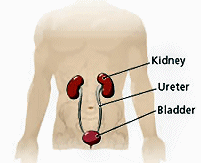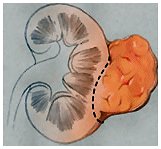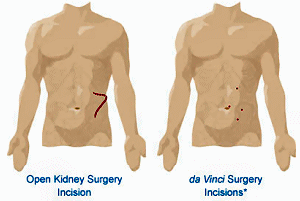Kidney Cancer
 Per national cancer Institute definition, kidney cancer includes renal cell carcinoma (cancer that forms in the lining of very small tubes in the kidney that filter the blood and remove waste products) and renal pelvis carcinoma (cancer that forms in the center of the kidney where urine collects). It also includes Wilms tumor, which is a type of kidney cancer that usually develops in children under the age of 5.
Per national cancer Institute definition, kidney cancer includes renal cell carcinoma (cancer that forms in the lining of very small tubes in the kidney that filter the blood and remove waste products) and renal pelvis carcinoma (cancer that forms in the center of the kidney where urine collects). It also includes Wilms tumor, which is a type of kidney cancer that usually develops in children under the age of 5.
Estimated new cases and deaths from kidney (renal cell and renal pelvis) cancer in the United States in 2008, per NCI date:
New cases: 54,390
Deaths: 13,010
Signs and Symptoms
 Possible signs of renal cell cancer include blood in the urine and a lump in the abdomen. There may be no symptoms in the early stages. Symptoms may appear as the tumor grows. A doctor should be consulted if any of the following problems occur: Blood in the urine, A lump in the abdomen, A pain in the side that doesn’t go away, Loss of appetite, Weight loss for no known reason, Anemia.
Possible signs of renal cell cancer include blood in the urine and a lump in the abdomen. There may be no symptoms in the early stages. Symptoms may appear as the tumor grows. A doctor should be consulted if any of the following problems occur: Blood in the urine, A lump in the abdomen, A pain in the side that doesn’t go away, Loss of appetite, Weight loss for no known reason, Anemia.
Treatment Options
There are different types of treatment options available for patients with kidney tumors:
Surgery
Surgery to remove part or all of the kidney is often used to treat kidney tumors. A person can live with part of one working kidney, but if both kidneys are removed or not working, the person will need dialysis (a procedure to clean the blood using a machine outside of the body) or a kidney transplant (replacement with a healthy donated kidney). When surgery to remove the cancer is not possible, a treatment called arterial embolization may be used to shrink the tumor. Small pieces of blocks are injected to the main blood supply to the kidney or the tumor to prevent the cancer cells from receiving any supply or oxygen.
The following types of surgery may be used:
• Partial nephrectomy (Open, Robotic Assisted, or Laparoscopic): A surgical procedure to remove the cancer within the kidney. Partial nephrectomy may be done to prevent loss of kidney function when the other kidney is damaged or has already been removed.
• Simple nephrectomy (Open, Robotic Assisted, or Laparoscopic): A surgical procedure to remove the kidney only.
• Radical nephrectomy (Open, Robotic Assisted, or Laparoscopic): A surgical procedure to remove the kidney,surrounding tissue, and, usually, nearby lymph nodes.
• Nephroureterctomy (Open, Robotic Assisted, or Laparoscopic): A surgical procedure to remove the kidney and the ureter. This procedure is used when the tumor is in the renal collecting system.
Robotic Assisted Laparoscopic Partial Nephrectomy
 Performing partial nephrectomy (removing part of the kidney that contains the tumor) using da Vinci Robotic System may make this procedure more efficacious than the standard laparoscopic approach or open surgery. One of the newest minimally invasive surgical techniques includes using a robot called the da Vinci Surgical System. This procedure is performed by making five small incisions (ports) into the abdomen and inserting surgical instruments through ports to carry out the procedure. I (Dr. Brian Miles) actually control the robot from the computer terminal in the same room as the patient but not at the patient site. I have an assistant who stands at the side of the patient, bringing in new instruments and helping with visualization, should there be small amounts of bleeding in the surgical field. Results from this surgical procedure are excellent. In the hands of an experienced robotic surgeon, they should be equivalent to the open technique. In my hands, cancer control is the same as the more traditional open technique and quality of life outcomes are equal or perhaps slightly better. Patients return to normal function and activity in a shorter period of time. This is due to significantly less blood loss and small incisions that lead for a quicker recovery. Patients are able to resume most normal activities within 2 weeks after the operation, and all normal activities 3 weeks after the operation. Hospitalization is generally 2-3 nights after the operation.
Performing partial nephrectomy (removing part of the kidney that contains the tumor) using da Vinci Robotic System may make this procedure more efficacious than the standard laparoscopic approach or open surgery. One of the newest minimally invasive surgical techniques includes using a robot called the da Vinci Surgical System. This procedure is performed by making five small incisions (ports) into the abdomen and inserting surgical instruments through ports to carry out the procedure. I (Dr. Brian Miles) actually control the robot from the computer terminal in the same room as the patient but not at the patient site. I have an assistant who stands at the side of the patient, bringing in new instruments and helping with visualization, should there be small amounts of bleeding in the surgical field. Results from this surgical procedure are excellent. In the hands of an experienced robotic surgeon, they should be equivalent to the open technique. In my hands, cancer control is the same as the more traditional open technique and quality of life outcomes are equal or perhaps slightly better. Patients return to normal function and activity in a shorter period of time. This is due to significantly less blood loss and small incisions that lead for a quicker recovery. Patients are able to resume most normal activities within 2 weeks after the operation, and all normal activities 3 weeks after the operation. Hospitalization is generally 2-3 nights after the operation.
Radiation therapy:
Radiation therapy is a cancer treatment that uses high-energy x-rays or other types of radiation to kill cancer cells or keep them from growing. Radiation therapy is usually not the first line treatment for kidney tumors.
Chemotherapy:
Chemotherapy is a cancer treatment that uses drugs to stop the growth of cancer cells, either by killing the cells or by stopping them from dividing. Renal cancers are not generally very responsive to chemotherapy.
Immunotherapy:
Immunotherapy is a treatment that uses the patient’s immune system to fight cancer. These substances use the patients’ immune system to fight the cancer. Immunotherapy can play an important role in the management of renal tumors.
Contact Info
Scurlock Tower Suite 2100
6560 Fannin Street
Houston, Texas 77030
Phone: (713) 441-6455
Fax: (713) 790-4456
info@drbrianmiles.com
Map and Directions

